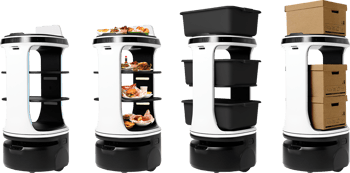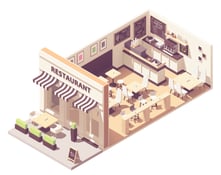“Through adversity, great things usually come,” says Joe Frillman, chef-owner of Daisies, a popular, pasta-focused restaurant in Chicago’s Logan Square neighborhood.
When the pandemic hit, Frillman was confident that if he could just get his restaurant to the other side, a better future would lay ahead. And he was determined to keep his staff employed.
As soon as Chicago put COVID dining restrictions into place, Frillman began pivoting his business, teaming up with his brother, a farmer, to turn Daisies into a famer’s market and grocery outlet. Then he added a to-go lunch program. And soon he was also selling meal kits. Each avenue became a lifeline to Daisies’ survival, while also creating jobs for existing employees.
“The guy who does all of our pasta has been working with me for 14 years, and I couldn’t just lay him off,” says Frillman, noting the decision to sell pasta by the pound in the market. “Then the restrictions here went on for two years, so it all came down to keeping employees and creating different lines of revenue to give them different options.”
Now that the industry has climbed out of the pandemic, it does appear that great things are on the horizon for Frillman. Over the past two years, he’s worked hard to turn adversity into opportunity, and his risk-taking is reaping rewards.
The grocery-market idea was such a success that Frillman’s decided to make it a permanent fixture. Starting in February, the concept will actually take over the entire Daisies location. A casual dinner program will be added at night. The original Daisies concept will shift to a new and bigger space down the street and will expand to include a daytime cafe. Frillman will continue to sell meal kits at the market. And he also plans to start a line of CPG products that’ll come out of the restaurant’s fermentation program.
Frillman is now full speed on a path towards becoming a rare pandemic success story. But he sees the growth as a necessity, not just a fortunate situation. As his brand broadens, he joins a growing number of operators using every tool at their disposal to create a flourishing business, in an industry where it’s hard to merely survive. What excites him most, he says, is creating more sustainability and opportunities for his staff.
We sat down with Frillman to chat more about all of Daisies’ COVID adjustments, his people-first approach, and how it’s all become an important part of the business plan.
The farmers market and grocery outlet became a pandemic survival tactic for you. But was this ever an idea you entertained pre-pandemic?
It was a little of both. Most of this came out of the pandemic, but I have experience in farmers’ markets and also experience seeing what my brother’s been able to do. My brother’s been farming for a good 10 years.
When the pandemic went down, he called me and was like, “Hey man, I just picked all my produce, hired people for it, and [the buyer] just canceled on me.” At the time, Chicago had mandated everyone to stay home and closed businesses, unless you were an essential worker. Our license allowed us to open as a retail store. So we said, well we have this produce, we have product, and people need food. We called other farmers we’ve been working with and other businesses in the neighborhood and opened this kind of bazaar.
The “bazaar” venture was obviously a success, given you’re making it permanent. Were you ever surprised at the amount of customers you received?
In our direct neighborhood, there’s a void of farm fresh produce. When you have to travel a mile in the city to get your groceries, it’s a hike. So we saw the void, but every day anyone even shows up to Daisies, I’m surprised. I’m constantly in disbelief that we have the following that we do. It’s humbling.
During COVID, we had people slipping checks through the mail slot saying they don’t want us to leave the neighborhood. The community support we saw was insane, so it was almost like, if we build it, they’ll support it. Not that that is an expectation, because it’s not, but we saw this desire for good sources of product made from quality individuals.
What went into the decision to move the original Daisies to a new location and fully devote the original space to this newer concept?
When we created the retail grocery store bazaar, we wanted to do everything we could to just bring people there. If we could get you in, we could sell you stuff. So we started doing lunch sandwiches as a way to get people in.
Dinner, that’s your cash cow, so of course we were going to go back to it. But once the restaurant came back, we had a clientele who wanted sandwiches all the time and wanted to shop at the store and farmers’ market. People would be banging on the door, and we’d be sitting there thinking, “Why did we close that?”
At the time, inflation wasn’t what it is now. Money was relatively inexpensive to borrow, and the true catalyst to get us out of the current space was that we just outgrew it. The space needs a facelift, and it was never meant to be a restaurant. We bought a bar and turned it into a restaurant, so it wasn’t efficient for the amount of volume we’re doing. So we’re moving down the street.
With seven years left on the [original location’s] lease, my brother, and the proximity – we’ve got 200 condos across the street, with no food for these people outside of a Target – it just made all the sense in the world [to keep doing the market].
Seeing your business grow – I imagine this must feel somewhat like a pandemic silver lining for you.
Yeah, I mean, we would’ve just continued on as a five-night-a-week restaurant with a brunch. But now to see the growth – it comes back to creating jobs. Before the pandemic, we had 25 people working with us. Now it’s 38 [people]. That means we’re headed in the right direction. We’ve had a lot of people that have been with us since day one, and so for us, that’s why it was really important to go this route. We wanted to keep those individuals working with us through the pandemic, and the benefits just trickled down for the rest of the community.
Can you describe what you envision for the permanent market and cafe space you’re building?
The lunch program is going to grow. But it’ll be a grocery store first and foremost. You’ll be able to walk up, order a sandwich, get your produce for the week, a pound of turkey, and a bottle of wine. You can come pick up your CSA box, also order a pound of pasta sauce, maybe a sous vide steak for dinner, whatever it is. You can basically meal plan for the week, and it becomes a thing for the community.
At the bar and back patio, which we’ll enclose to become a year-round patio, we’ll offer a dinner service. We’re still working through what that menu is, but it’ll be casual in the sense that while people can go there and eat an entire meal, it’ll be a lot of craveable, shareable snacks.
We used to buy whole animals, and we’d do the fabrication, and this allows us to do an extension of that and sell it in the deli case, and whatever doesn’t sell, we’ll use for the menu. Same for the produce. The kale isn’t going to last a week, so on day five, you braise it down and serve it on the menu. It’ll be that mentality applied to the menu, so it’ll naturally be vegetable-forward.
In a way, you’re expanding from one restaurant to four businesses – a new and larger Daisies, the market and cafe, a CPG line of products, and also meal kits. Are you at all nervous about that jump in growth and are there any key strategies you’re taking to stay on top of everything?
We think about it all the time. The emphasis for us is about our staff.
In our mission statement, it says in writing, our employees are the most important commodity that we have. So we offer health benefits, a 401K retirement match, and we try to give paid time off for hourly employees. It costs us a lot of money to do these things, but I promise you it costs a lot more to replace people over and over again. Training is so expensive. And I have a family as well. I don’t want to be sitting here and constantly plugging holes.
We’re starting to see a return on that. Our staff tenure has never been longer. They now become the people inoculating the cultures in the next business ventures, and it becomes a little easier of a lift from a training perspective because you have a great group of people who know how we do things.
But it’s a constant struggle. We’re constantly looking for those right people that want to grow and learn and be a part of something that’s community driven. It just comes down to finding the right people, and those people are usually hanging out with other cool people, so a lot of our [staff] come from referrals. That’s not something I’ve seen a lot in my career.
Do you feel that having a second or even third line of revenue stream is simply now a mandatory part of running a restaurant?
Yes – there’s no other answer. I don’t understand how we did what we did prior. We were open probably 30 hours a week, four days a week, but our rent was still our rent for the month.
It’s also a way to monetize and maximize [a business] so that it's sustainable for the staff. And I think that’s very important because I constantly hear people talk about how tired they are. We've talked about using the all-day functionality of the restaurants to be able to give people either different schedules entirely or peppering in two days a week of working in the daytime.
We have people who have families of their own, and this is a way where they can be in an industry that they like, but they get to go home and see their family. Plus, giving them those cross-utilized skill sets is awesome.
What are you personally most excited about in terms of your expansion and new endeavors?
I’m excited to see what we collectively can pull off. I’m excited to give these really talented people the tools that they’ve needed to provide the products we’re looking to provide. We have this blank slate, and down the street, we also have a kitchen in a restaurant that’s actually efficient.
I’m also just really excited for the grocery dinner concept. At first it was the afterthought. But I was just at this place in Rome, Roscioli, and it was the most unbelievable place on earth. It’s a grocery store. You can buy all this stuff off the walls, but they also served some of the best food I’ve ever had. It just comes off as so nonchalant – I just made this awesome food in a grocery setting.
Grace Dickinson is a reporter at Back of House. Send tips or inquiries to grace@backofhouse.io.





